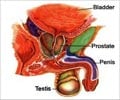Highlights:
- Vasectomy, a common method of reversible male sterilization operation, has been found to be associated with an increased risk of prostate cancer in the long term, following a detailed analysis of nationwide health registries in Denmark
- The study showed vasectomy to be linked to a long-term increased risk of prostate cancer, which can occur from 10 years after the operation. However, the absolute risk of prostate cancer is small and comparable to increased risk of breast cancer in women who use the oral contraceptive pill
The vas deferens is the tube which conveys the sperm from the testes to the urethra during ejaculation of semen. Cutting the vas deferens (vasectomy procedure) therefore prevents the sperm from entering the semen. The ejaculate will not contain sperms and vasectomized men will not be able to father children.
Read More..
Association Between Vasectomy and Prostate Cancer
- The study team obtained data from Danish national health registers that included a population of 2,150,162 Danish men between January 1937 and December 1996
- The average duration of follow-up was 24.8 years per person
- Overall, 26,238 cases of prostate cancer were reported in the study population (2,150,162) during the study period
- On the whole, vasectomized men showed a 15% higher relative risk of prostate cancer compared to men who had not undergone vasectomy
- According to the study team, even after limiting the analysis to occurrence of metastatic prostate cancer and cancer that spread beyond the covering capsule of the prostate, vasectomized men showed a higher risk of prostate cancer
- The increased risk of prostate cancer after vasectomy started 10 years after the procedure remained for at least 30 years after the procedure regardless of the age at vasectomy and stage of prostate cancer at diagnosis
- Men who had undergone vasectomy were found to have a lower risk of other cancers compared with men who had not, suggesting that vasectomized men are healthier compared to the general population
The possible reasons for this observation according to the study authors are that vasectomy removes the potential protective effect of increased sperms in the semen as well as having more offspring (fecundity) against prostate cancer.
Possible Demerits of Study
- The study did not include prostate-specific antigen screening (PSA) data of the participants or clinical evaluation such as digital rectal examination (DRE) findings which are important in evaluating prostate cancer risk
- Previous studies have concluded that vasectomy is a safe procedure and does not increase prostate cancer risk
- The data of the current study are therefore not sufficient to establish a definite causal relationship between vasectomy and prostate cancer
Prostate Cancer
Prostate cancer is malignancy of the prostate, a small walnut-shaped gland in men that forms the seminal fluid that nourishes the sperms and helps in their transport to the urethra.Risk of prostate increases with age, obesity, family history and is higher in black men. Screening tests for prostate cancer for early diagnosis include estimation of serum PSA which will be elevated and needs confirmatory tests to establish or rule out the diagnosis and determine the stage and risk of spread.
Treatment of prostate cancer depends on its severity and stage and includes surgery, radiation and hormone therapy as well as chemotherapy and biological therapy.
The Danish study finds a small overall risk of prostate cancer in vasectomized men compared to men who are not vasectomized. However due to lack of sufficient data, a causal association between vasectomy and prostate cancer cannot be definitely established.
References:
- Vasectomy and prostate cancer risk: a 38-year nationwide cohort study - (https://doi.org/10.1093/jnci/djz099)
- Vasectomy Increases Prostate Cancer Risk Over Time - (https://www.medscape.com/viewarticle/913655#vp_2)
Source-Medindia







![Prostate Specific Antigen [PSA] Prostate Specific Antigen [PSA]](https://www.medindia.net/images/common/patientinfo/120_100/prostate-specific-antigen.jpg)





